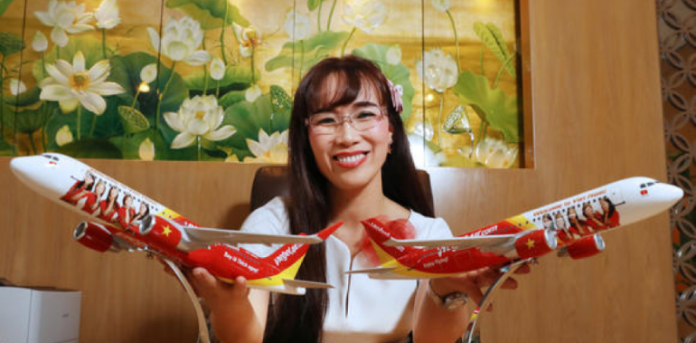VietJet Air CEO Nguyen Thi Phuong Thao is poised to become Southeast Asia’s first self-made female billionaire.
ATSUSHI TOMIYAMA
HANOI In March, Bloomberg ran an article saying VietJet Air’s upcoming initial public offering will make its CEO, Nguyen Thi Phuong Thao, Southeast Asia’s first self-made female billionaire. Vietnam’s first private budget carrier controlled 43% of the domestic market in June, beating out flag carrier Vietnam Airlines. It is rare for a private company to be at the top of the industry totem pole in a communist country where state enterprises still dominate the economy.
VietJet was founded in 2007 and began offering flights at the end of 2011. Thao’s keen ability to spot trends before they happen is a big factor behind the airline’s dramatic growth.
She became interested in the aviation industry in 2001, six years before the government opened it and some other industries to the private sector.
Thao’s thinking was that although Vietnam lagged behind Malaysia in economic development, her country was fertile ground for a budget-carrier boom. Partly behind her reasoning were the facts that the country had an underdeveloped public transportation system, a large population of 90 million, and a long, narrow geography that lent itself to air travel.
Furthermore, she believed that deregulation was bound to come to the domestic aviation industry soon. Confident about the industry’s future, she began a feasibility study to gauge the viability of her ideas, then approached the government about deregulation.
Thao learned the importance of looking ahead in 1988, when she was a student in Moscow. Around that time, the Soviet Union was in the midst of the perestroika campaign to reconstruct the country’s political and economic systems. Despite the growing popular enthusiasm for the reforms, poverty was rampant, and people faced constant shortages of food and other basic goods. Witnessing these problems, Thao began importing goods from Asian countries using money collected from her friends and relatives.
After graduating from university in Moscow, Thao returned to Vietnam with $1 million she earned from her importing activities and used that money to launch a business. She quickly diversified, branching out into financial services, real estate and power generation equipment. Now, she is trying her hand at the aviation business.
BIKINI TACTICS Thao is not averse to gimmickry. To attract customers, VietJet once offered in-flight dance performances by bikini-clad flight attendants. Videos and images of the shows quickly made the rounds on social media. The domestic authorities eventually penalized the airline for violating local aviation regulations.
While that episode may raise questions about the treatment of women in the company, VietJet is in fact progressive in its employment practices. Its rules guarantee that women hold a certain percentage of management positions. For example, women are required to account for more than 70% of the managers supervising flight attendants.
“I want to see Vietnam become a country where women can work more easily and play a greater role,” Thao said. She recalled the difficulty of being a working mother with two children, saying she was sometimes forced to take her kids on business trips.
VietJet now wants to expand its international footprint. To help make that happen, the airline has ordered 126 planes from Airbus and 100 planes from Boeing. As a result, VietJet’s fleet is projected to increase sevenfold to 250 by 2023.
VietJet strives for low costs and high service quality, said the CEO. Thao said she wants to set the airline apart by, for example, offering easier connections and better meal options.
To fund its expansion, the airline plans to carry out an IPO by the year end. When Thao — who Airbus COO John Leah once described as having an iron hand in a velvet glove — actually becomes Southeast Asia’s first female billionaire, Vietnam’s first budget carrier will like be ready to declare itself a player in the global aviation market.











